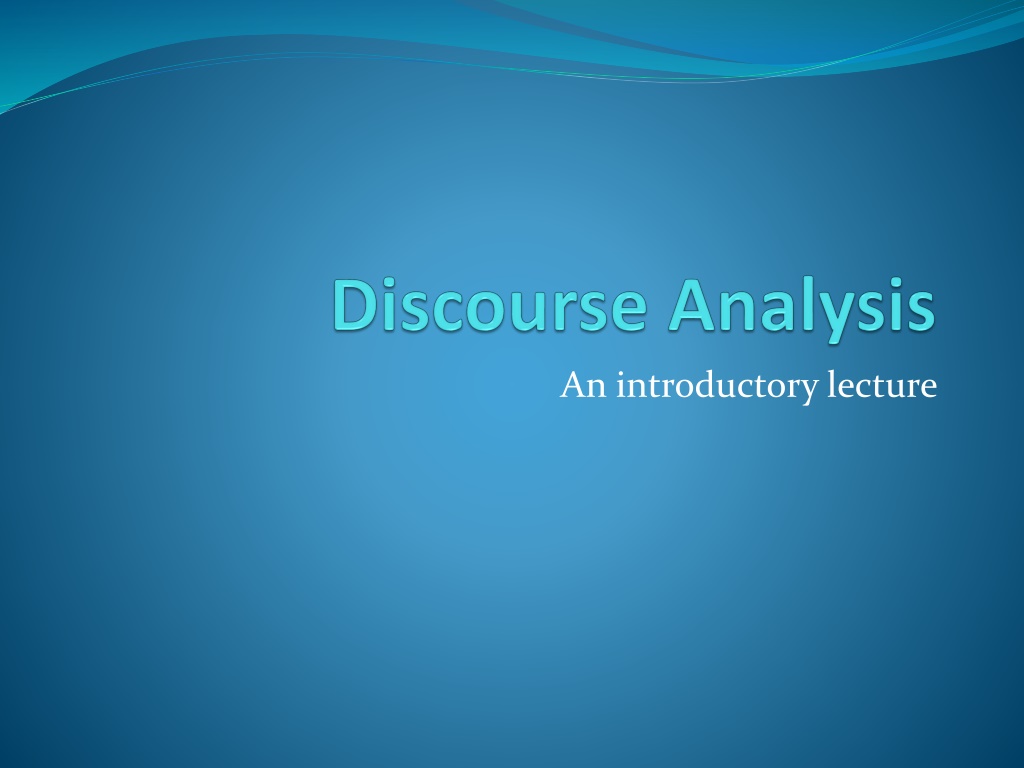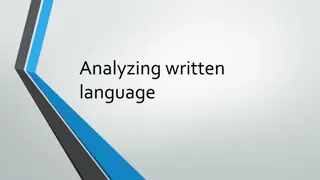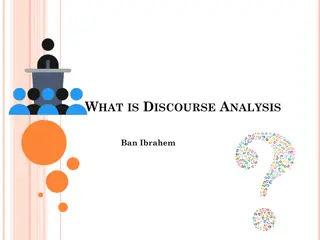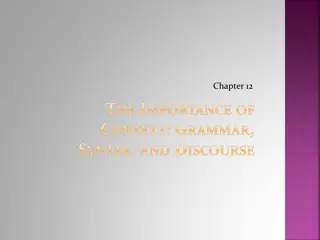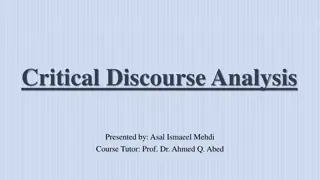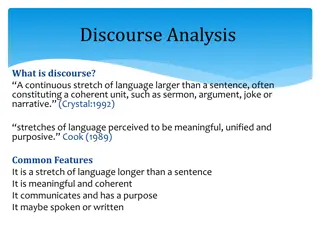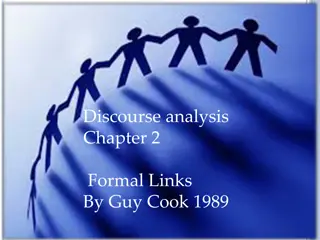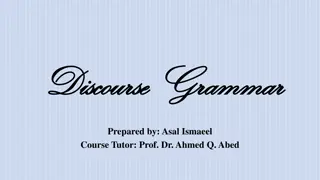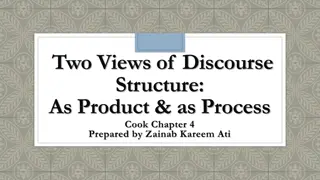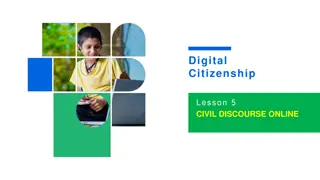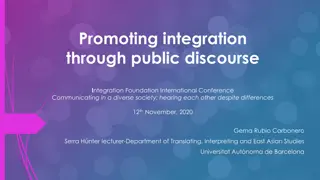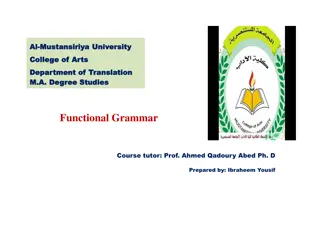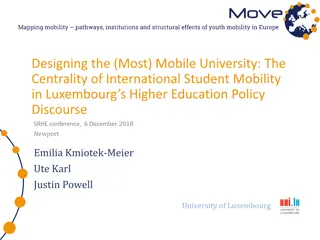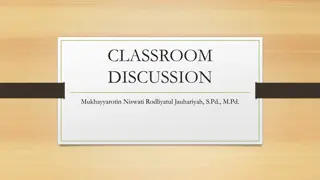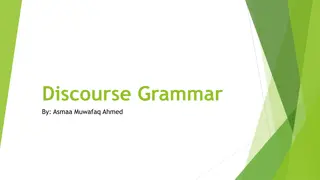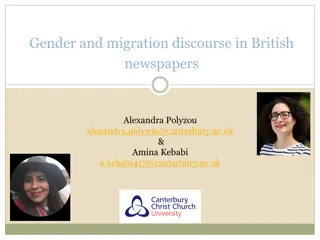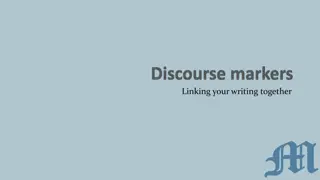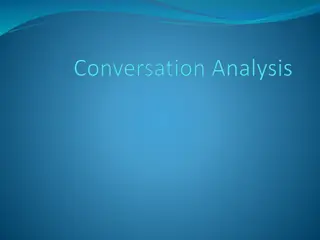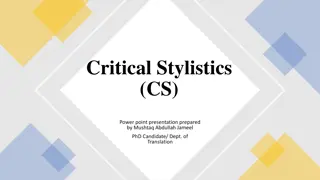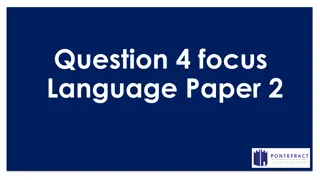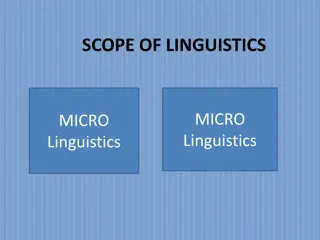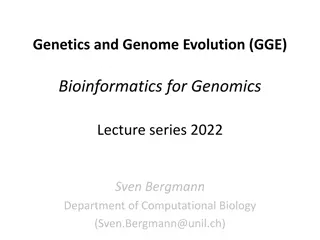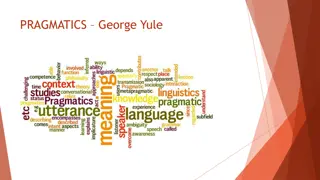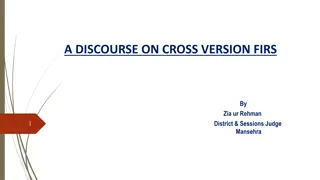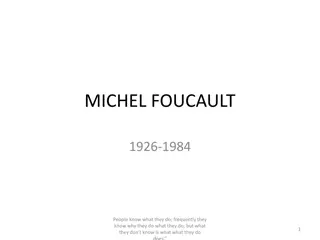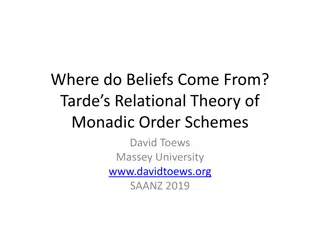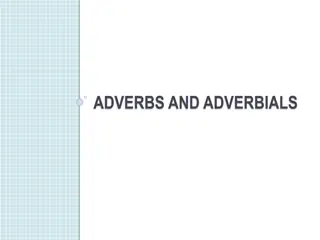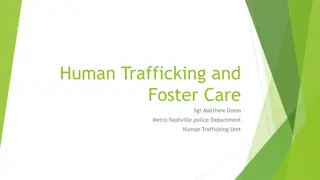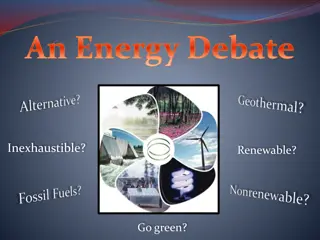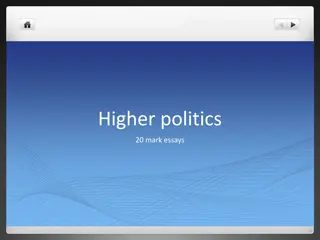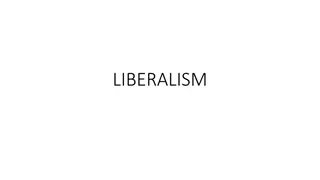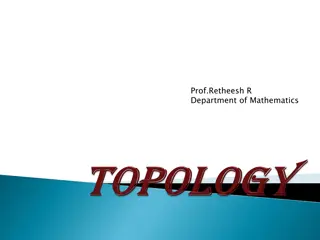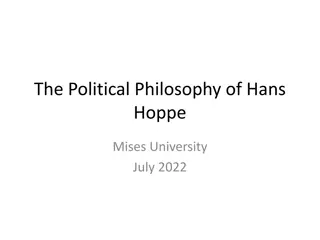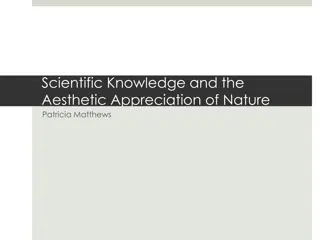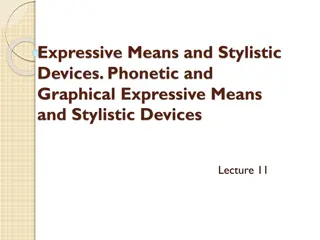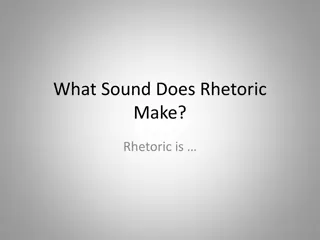Understanding Discourse Analysis: An Overview
Discourse analysis is the study of language in use within its social context. It involves analyzing written or spoken language to understand how it is employed in real-life situations. This research method focuses on the purposes and effects of language, cultural conventions, communication of values and beliefs, and the relationship between language use and its societal, political, and historical backdrop. Discourse analysis is a valuable tool utilized in various disciplines such as sociology, anthropology, psychology, and cultural studies.
Download Presentation

Please find below an Image/Link to download the presentation.
The content on the website is provided AS IS for your information and personal use only. It may not be sold, licensed, or shared on other websites without obtaining consent from the author. Download presentation by click this link. If you encounter any issues during the download, it is possible that the publisher has removed the file from their server.
E N D
Presentation Transcript
What is Discourse Analysis? The term discourse analysis was first used by the sentence linguist, Zellig Harris in his 1952 article entitled Discourse Analysis . According to him, discourse analysis is a method for the analysis of connected speech or writing, for continuing descriptive linguistics beyond the limit of a simple sentence at a time (Harris 1952). .
Meanwhile, scholars have attested to the difficulty in coming up with a comprehensive and acceptable definition for discourse analysis.
However, a way to simplify the attempt to define discourse analysis is to say that discourse analysis is the analysis of discourse . The next question, therefore, would be what is discourse?
Discourse can simply be seen as language in use (Brown & Yule 1983; Cook 1989). It therefore follows that discourse analysis is the analysis of language in use. By language in use , we mean the set of norms, preferences and expectations which relate language to context. Discourse analysis can also be seen as the organization of language above the sentence level. The term text is, sometimes, used in place of discourse . (
What is discourse analysis? Discourse studying written or spoken language in relation to its social context. It aims to understand how language is used in real life situations. analysis is a research method for
When you do discourse analysis, you might focus on: The purposes and effects of different types of language Cultural rules and conventions in communication How values, beliefs and assumptions are communicated How language use relates to its social, political and historical context
Discourse research method in many humanities and social science disciplines, sociology, anthropology, psychology and cultural studies. analysis is a common qualitative including linguistics,
The concern of discourse analysis is not restricted to the study of formal properties of language; it also takes into consideration what language is used for in social and cultural contexts.
Discourse analysis, therefore, studies the relationship between language (written, spoken conversation, institutionalized forms of talk) and the contexts in which it is used. What matters is that the text is felt to be coherent.
Guy Cook (1989:6-7) describes discourse as language in use or language used to communicate something felt to be coherent which may, or may not correspond to a correct sentence or series of correct sentences. Discourse analysis, therefore, according to him, is the search for what gives discourse coherence.
He suggests that discourse does not have to be grammatically correct, can be anything from a grunt or simple expletive, through short conversations and scribbled notes, a novel or a lengthy legal case. What matters is not its conformity to rules, but the fact that it communicates and is recognized by its receivers as coherent.
Similarly, Stubbs (1983:1) perceives discourse analysis as a conglomeration of attempts to study the organization of language and therefore to study larger linguistic units, such as conversational exchanges or written text.
Again, we affirm that what matters in the study of discourse, whether as language in use or as language beyond the clause, is that language is organized in a coherent manner such that it communicates something to its receivers.
some of the different approaches to the linguistic analysis of discourse: speech act theory, interactional sociolinguistics, ethnography of communication, pragmatics, conversation analysis, and variation analysis. (
What are the four types of discourse? Description, Narration, Exposition, and Argumentation
What is discourse analysis used for? Conducting discourse analysis means examining how language functions and how meaning is created in different social contexts. It can be applied to any instance of written or oral language, as well as non-verbal aspects of communication such as tone and gestures.
Materials that are suitable for discourse analysis include: Books, newspapers and periodicals Marketing material, such as brochures and advertisements Business and government documents Websites, forums, social media posts and comments Interviews and conversations
By analyzing these types of discourse, researchers aim to gain an understanding of social groups and how they communicate.
How is discourse analysis different from other methods? Unlike linguistic approaches that focus only on the rules of language use, discourse analysis emphasizes the contextual meaning of language. It focuses on the social aspects of communication and the ways people use language to achieve specific effects (e.g. to build trust, to create doubt, to evoke emotions, or to manage conflict).
Instead of focusing on smaller units of language, such as sounds, words or phrases, discourse analysis is used to study larger chunks of language, such as entire conversations, texts, or collections of texts. The selected sources can be analyzed on multiple levels.
What is an example of discourse? The definition of discourse is a discussion about a topic either in writing or face to face. An example of discourse is a professor meeting with a student to discuss a book. Discourse is defined as to talk about a subject. An example of discourse is two politicians talking about current events.
